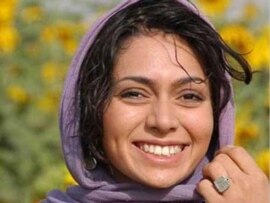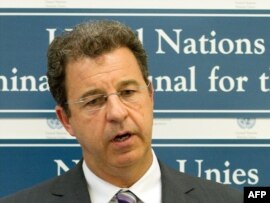Iranian blogger expected at women's World Cup reported missing
| Publisher | Radio Free Europe/Radio Liberty |
| Publication Date | 14 July 2011 |
| Cite as | Radio Free Europe/Radio Liberty, Iranian blogger expected at women's World Cup reported missing, 14 July 2011, available at: https://www.refworld.org/docid/4e390551c.html [accessed 31 May 2023] |
| Disclaimer | This is not a UNHCR publication. UNHCR is not responsible for, nor does it necessarily endorse, its content. Any views expressed are solely those of the author or publisher and do not necessarily reflect those of UNHCR, the United Nations or its Member States. |
July 14, 2011
 Iranian actress and blogger Pegah Ahangarani
Iranian actress and blogger Pegah Ahangarani
Iranian actress and blogger Pegah Ahangarani is missing amid concerns she may have been arrested in Tehran, RFE/RL's Radio Farda reports.
Ahangarani was scheduled to travel to Germany on July 4 to blog about the 2011 women's soccer World Cup for Deutsche Welle.
Farhad Payar, an independent journalist who also works with Deutsche Welle, told Radio Farda on July 13 that Ahangarani was summoned to Iran's Intelligence Ministry the day before her planned departure and warned she would be arrested if she went to the airport.
Payar added that Ahangarani has been missing for the past few days and no one has heard from her. He said that after Ahangarani was threatened she would not go anywhere alone.
Ahangarani had visited Germany in 2009 to blog from the Berlin International Film Festival (Berlinale) for Deutsche Welle.
As a member of opposition presidential candidate Mir Hossein Musavi's election campaign team during the disputed June 2009 presidential election, she was summoned and interrogated during the postelection unrest.
A second Iranian woman sports photojournalist, Maryam Majd, who was scheduled to travel to Duesseldorf, Germany on June 17 to report on the women's soccer World Cup, was arrested just before her trip.
Majd, a member of a campaign that supports Iranian women being allowed to attend men's soccer games, is still in custody but it is not known on what charges she is being held.
It is Serbia's second major extradition of a high-profile war crimes suspect in less than a month, following the capture in late June of wartime Bosnian Serb commander Ratko Mladic.
The 52-year-old Hadzic's lawyers signed documents renouncing his right to appeal the extradition, according to RFE/RL's Balkan Service.
Earlier in the day, Hadzic was taken from a detention unit in Belgrade to the Belgrade airport in a convoy of jeeps and police cars, with no official confirmation it was him until after the plane took off.
Only after it left the ground did Serbian Justice Minister Snezana Malovic tell reporters: "At this moment, his plane is on its way to The Hague."
"I inform you, that in morning hours I have signed extradition order for Goran Hadzic to be transferred to The Hague war crimes tribunal," Malovic told reporters. "By this act , the hardest chapter in the cooperation with The Hague tribunal, and the biggest obligations have been fulfilled."
'A Tremendously Historic Day'
Once Hadzic arrived in the Netherlands and was transferred to a detention center, tribunal spokesperson Nerma Jelacic said putting their last wanted fugitive in custody was a "tremendously historic day" and that the tribunal was "one of the rare institutions that has managed to get every single one of ... the indictees,for the heinous crimes that have been committed over the bloody decade that ravaged the Balkans from 1991 to 2000."
Hadzic is the ninth international war-crimes indictee to have been captured by Serbian authorities in the past eight years and brings to 38 the number of inmate at the Hague tribunal's Scheveningen detention facility, RFE/RL's Balkan Service reports.
The extradition comes just two days after Hadzic was captured on July 20 in the region of Fruska Gora, in western Serbia, just a few miles from the village across the Croatian border where he was born.
He had been on the run since he was charged in 2004 on 14 counts of war crimes and crimes against humanity. He is the the last of 161 people indicted by the International Criminal Tribunal for the former Yugoslavia (ICTY) for their roles in bloody 1990s wars that tore apart the former Yugoslavia.
The charges against Hadzic stem from atrocities that occurred in Croatia from 1991-95. The indictment particularly mentions a 1991 massacre in Vukovar in which some 250 non-Serbs were shot and buried in unmarked graves at a farm – one of the earliest atrocities of the bloody conflicts in Yugoslavia.
According to the International Criminal Tribunal for the Former Yugoslavia (ICTY), Hadzic was also among those responsible for the leveling of Vukovar, which is said to be the first European city entirely destroyed since World War II.
On July 22, Serge Brammertz, the Hague court's chief war crimes prosecutor, maintained that Hadzic will now have to answer the host of accusations against him.
"[Hadzic is accused of] extermination, murder and unlawful imprisonment, torture, beatings, deportation, forcible transfers and the destruction of homes and property," he said. "He will be called up to answer for the deaths of hundreds and the displacement of thousands."
 The Hague tribunal's chief war crimes prosecutor Serge Brammertz
The Hague tribunal's chief war crimes prosecutor Serge Brammertz
Speaking to reporters, Brammertz also thanked the European Union, whose "principled policies of the European Union enlargement have given Serbia positive incentives to cooperate with the tribunal."
The arrests of Hadzic and of Bosnian Serb military commander Ratko Mladic, who was captured in late May, were viewed as prerequisites for Belgrade to further integrate into European structures.
Alongside Brammertz, ICTY Registrar John Hocking said that Hadzic's arrest has an impact beyond the territory of the former Yugoslavia:
"[Hadzic's arrest] sends a very big signal throughout the world that international criminal justice is achievable," he said. "His arrest confirms the extraordinary success story that is the ICTY."
Serbian war crimes prosecutor Vladimir Vukcevic told reporters earlier this week that police were able to catch Hadzic thanks to finding last year a stolen painting by Italian artist Amedeo Modigliani that Hadzic allegedly was trying to sell.
The prosecutor said that after monitoring the financial network of Hadzic's suspected aides for months, police found out he was to meet a money courier on July 20 in a forest near the village of Krusedol in the region of Fruska Gora.
Final Wish Granted
Vukcevic said Hazdic was armed but did not resist arrest.
Hazdic was granted a final wish to visit his ailing mother and other family members at his family home in Novi Sad under police escort early on July 22 ahead of his extradition.
Serbian media reported that before leaving for Novi Sad, Hadzic also received a visit on July 21 in his cell in Belgrade from his mistress and the child he had with her. He also reportedly met with his wife and children in his Belgrade cell.
Hadzic is scheduled to appear before a judge on July 25 at 4 p.m. local time, where he will be asked to enter a plea of guilty or not guilty to the charges against him.
It could take up to a year for his trial to open.
based on RFE/RL Balkan Service and agency reports
Link to original story on RFE/RL website
